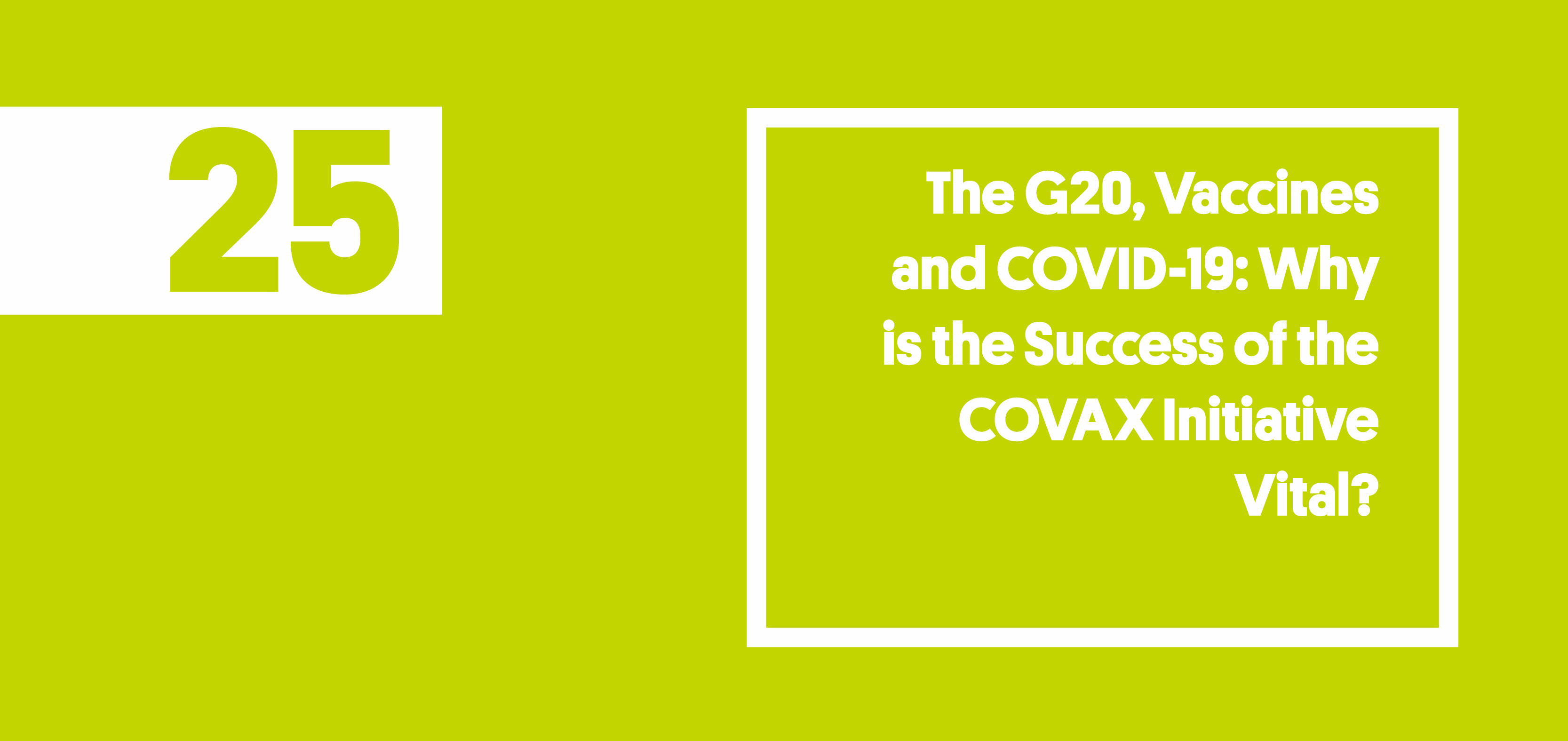The G20, Vaccines and COVID-19: Why Is the Success of the COVAX Initiative Vital?
Series |COVID-19 and response strategy #25
13.11.2020This document is part of a series of discussion notes addressing fundamental questions about the COVID-19 crisis and response strategies. These documents are based on the best scientific information available and may be updated as new information comes to light.
Written by Virginia Rodríguez, in charge of ISGlobal’s advocacy project, the focus of the present document is COVAX, the vaccine pillar of ACT Accelerator initiative, created with the support of the World Health Organisation (WHO) and one of the objectives of the Riyadh summit. It is an explanation of how COVAX responds to the challenges posed by the need for universal and equitable access to immunisation against COVID-19, which last May was recognised by the WHO as a global public good.
COVAX: the Pillar for Achieving a Globally Accessible and Affordable Vaccine
The challenge facing the international community is to accelerate the development of a number of effective vaccines against COVID-19. Several candidates are already in clinical trials and others will soon reach that stage. Pending the results of these trials, the other challenge is to increase production capacity in order to ensure equitable distribution of the vaccines that receive regulatory approval. The aim of COVAX is to have 2 billion doses of an effective vaccine available by end 2021, the number considered sufficient to end the acute phase of the pandemic. To achieve this, the initiative must, by the end of 2020, raise sufficient resources to finance this goal.
To respond to these two challenges, the work of COVAX is organised into two areas:
- The first of these is responsible for channelling funds through CEPI to speed up the development of candidate vaccines.
- The second is the COVAX Facility, a GAVI-led platform set up to ensure equitable procurement and distribution of the vaccines that receive regulatory approval. COVAX guarantees vaccine manufacturers a volume of demand on a scale that encourages them to immediately take the necessary steps to increase their production capacity and also to start manufacturing effective vaccines as soon as they are approved.
To develop this demand, the COVAX Facility has identified two different groups of countries.
- Self-financing countries, which can either make a firm commitment or acquire options to purchase the number of doses they wish under the same pre-established conditions for all.
- Lower- and middle-income countries, which are eligible for the Advance Market Commitment (AMC) mechanism, a tool that enables Official Development Assistance (ODA) donor countries to fund vaccine access in developing countries once manufacturing begins.
National Interests on the Road to a Multilateral Response
The COVAX initiative is a multilateral and collaborative response to the pandemic, promoted by several international bodies, including the United Nations, WHO, G20 and EU. It has emerged at a time when multilateralism and the international balance of power are being redefined as a result of the multiple crises triggered by the COVID-19 pandemic. Certain key actors in the international system—the United States of America and Russia, for example—have chosen not to participate in this initiative, retreating to positions defined by nationalist messages and policies and focusing their efforts and resources on procuring supplies for their own countries. On the other hand, China recently announced its withdrawal from COVAX.
The case of the EU perfectly illustrates the tension between the desire for international cooperation and the interest, in this case of a region, in ensuring sufficient supply for a group of countries in one of the world´s richest regions. One the one hand, the EU has been one of the main drivers of COVAX since its creation; on the other, as a group it has entered into bilateral negotiations with manufacturers for the acquisition of doses for all its Member States.
Latin America: No-Man’s Land
The Latin American region illustrates the situation of many middle-income economies in the global response to the pandemic. The impact of COVID-19 is exacerbating their inequities and vulnerability, but none of the tools designed to provide universal and equitable access to vaccines offer them a specific response.
Most of the countries in the region are not eligible for the AMC (only Haiti, Bolivia, El Salvador, Honduras, Nicaragua, the Dominican Republic, Grenada, Guyana, Saint Lucia and Saint Vincent and the Grenadines). The only option open to them is to choose one of the two modalities offered by the COVAX Facility to self-financing countries under the same conditions as economies with greater resources.
The Pan American Health Organisation (PAHO, the WHO regional division for the Americas) recognises COVAX as the key option for providing early access to vaccines for most of the countries in the region and is contributing on behalf of the bloc through the PAHO Revolving Fund for Vaccine Access.
What Role Can Spain Play in this Scheme? Two Recommendations
The Spanish Government has on numerous occasions expressed a desire to be involved in multilateral initiatives, the effort to achieve the goals of the 2030 Agenda for Sustainable Development, gender equality and human rights. These are the fundamental pillars of its foreign policy. Few actions would be more consistent with this expressed desire than a firm financial and political commitment to COVAX at a time when Spain needs to define its role as a global player.
To make good on this commitment, the Government needs to do more than declare its support for the COVAX initiative, it must take steps to procure vaccines using the mechanisms offered by the Facility. Likewise, Spain should promote this commitment to the initiative within the EU, encouraging it to make its own agreements with the COVAX Facility for vaccine supplies.
- Within the EU, Spain should promote the importance of making the COVAX Facility the global vaccine procurement mechanism par excellence.
- Spain should provide an example of this commitment to COVAX. The following is a concrete proposal on how this can be achieved.




